Bearded dragons have become popular pets in recent years due to their docile nature and low-maintenance care. However, as they are still wild animals, pet owners are often curious if bearded dragons bite. In this blog post, we will explore the reasons why bearded dragons bite, what you can do to prevent it, and how to handle the situation if a bite occurs.
Pros and Cons of Having a Bearded Dragon As a Pet
Pet ownership is a fulfilling experience but it comes with a sense of responsibility. For those interested in exotic pets, these reptiles will probably become the best choice. Beardies are docile and can be great companions for their owners. However, before bringing a Bearded Dragon home, it’s important to weigh the pros and cons of this decision. In this part, we will discuss the advantages and disadvantages of having a Bearded Dragon as a pet.
Pros of having a bearded dragon as a pet
Low maintenance
Bearded Dragons need pretty low maintenance. To their must-have list belong a clean enclosure, fresh water and food, and a heat source.
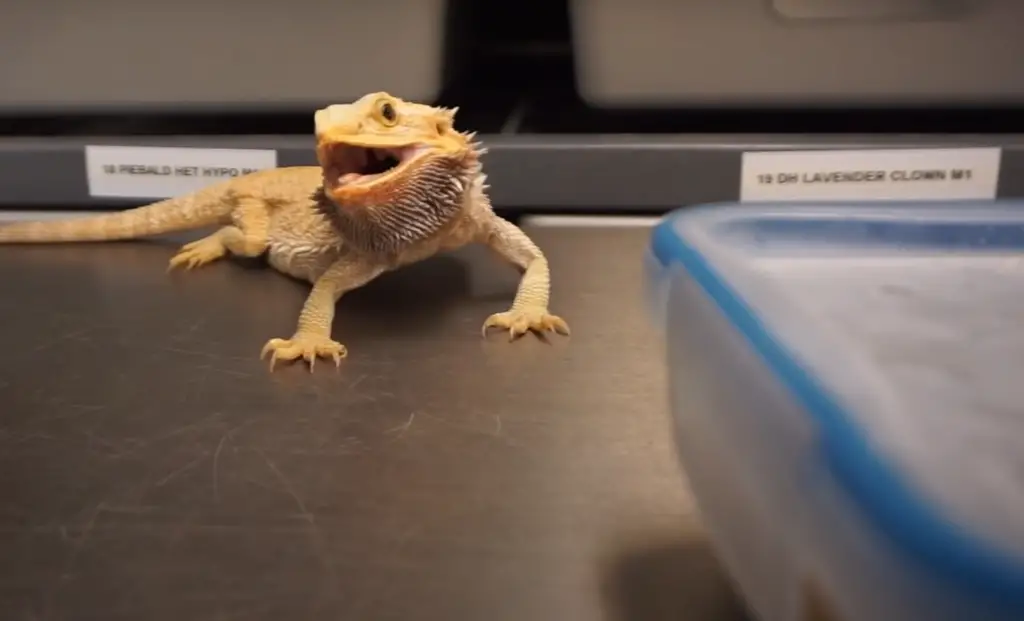
Unlike other pets, they don’t require daily walks and can be left alone for a day or two as long as their basic needs are met.
Active and personable
That’s not a secret that these reptile pets have energetic personalities making them unique compared to other reptiles. They also tend to show affection by cuddling or nuzzling up to them. [1]
Intelligent
Bearded Dragons are intelligent creatures so if you devote some time and energy, you will even train them to follow some commands. They also have excellent memory and it helps them recognize their owners.
Cons of having a bearded dragon as a pet
Initial costs
These pets need the proper environment to live in such as a vivarium, UV lighting, and thermostats which can come at a high cost. The initial costs of purchasing a Bearded Dragon, equipment, and food can be daunting.
Health concerns
Bearded Dragons can suffer from various health concerns for example, metabolic bone disease and respiratory infections which can be expensive to treat. Regular visits to the vet are essential for keeping your pet healthy.
Lifespan
Bearded Dragons’ lifespan usually lasts for 10-15 years which can be a long-term commitment. They may outlive the owner’s willingness and ability to care for them.
So, these reptiles make great pets for those who are looking for a low maintenance, unique, and personable companion. However, before committing to this exotic pet, one must think about all the pros and cons of ownership. Potential owners should be willing to invest time, money, and energy in creating the correct environment, maintaining their health, and being a responsible owner to ensure a happy life for the Bearded Dragon.
Bearded Dragons’ Usual Behavior
Owning a pet comes with a lot of responsibility, and Bearded Dragons are no exception. Contrary to popular belief, these reptiles are not just idle creatures. They are known for their active behavior and unique personality. As a devoted and responsible pet owner, it is crucial that you understand your Bearded Dragon’s typical behavior.
Bearded Dragons are Diurnal
These reptiles are usually active during the day and sleep at night. As diurnal animals, they require around 12-14 hours of daylight every day to maintain their health and wellbeing.
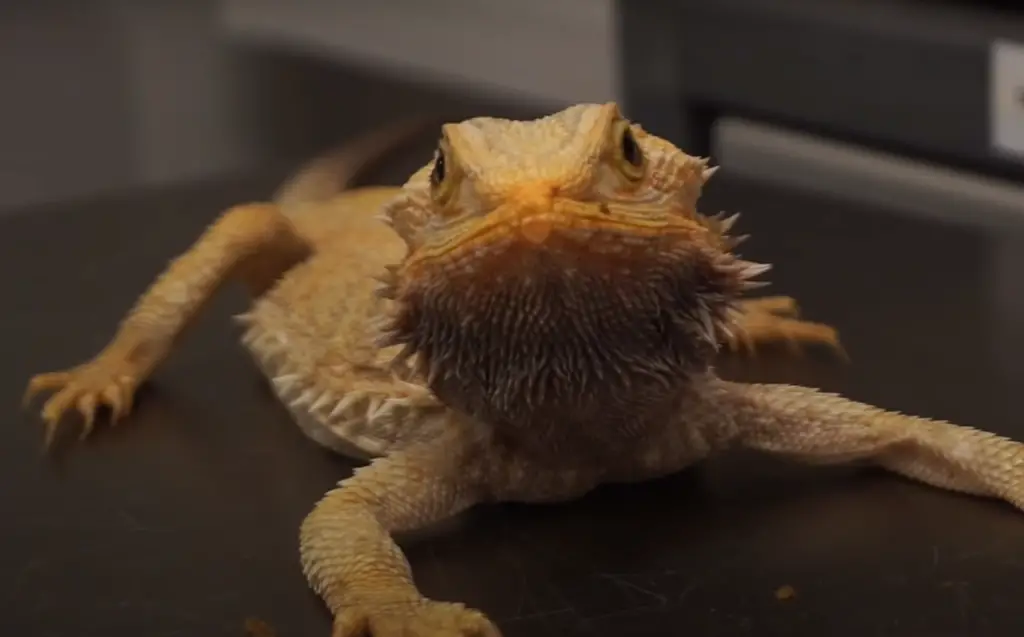
Ensure your enclosure’s lighting is adequate to mimic the natural sunlight they would receive in the wild.
Bearded Dragons are Territorial
In their natural habitat, Bearded Dragons are solitary creatures. They establish territories to call their own and will defend it rigorously. When you introduce another Bearded Dragon to the enclosure, ensure there is adequate space to accommodate both and prevent any territorial conflicts.
Bearded Dragons are Curious
Bearded Dragons are known to be quite curious and active. They spend their daytime exploring their surroundings, basking, and hunting for food. Provide them with hideouts, rocks, and platforms in their enclosure to create an environment that mimics their natural habitat.
Bearded Dragons are Social
Bearded Dragons thrive in an environment that offers them social interaction. While they may not be able to form relationships with their owners, they will still gladly spend time around you while basking. Creating an enriching environment with toys, hideouts and platforms will keep them content and entertained.
Bearded Dragons are Docile
Bearded Dragons are relatively docile creatures that are easy to tame. They are not prone to biting or attacking and can be held without issue as long as they feel safe. With regular handling and positive reinforcement, they can even learn to recognize their owners and develop a bond.
Beardies are fascinating creatures that have captured the hearts of many pet owners. Understanding your Bearded Dragon’s typical behavior is the first step in providing them with a safe and happy environment. Enclosures that mimic their natural habitat, a well-balanced diet, and regular veterinary visits to maintain their health are all crucial factors in caring for a Bearded Dragon. May this blog provide you with comprehensive information about everything you need to know about Bearded Dragons’ behavior to make the most out of your pet ownership.
Do Bearded Dragons Bite?
Bearded dragons are one of the easiest reptiles to take care of and are great for first-time reptile owners. However, before making the commitment to owning a bearded dragon, it’s essential to understand their behaviors, including their biting habits.
The first thing to understand is that bearded dragons are generally docile and friendly creatures. They are not aggressive by nature and are unlikely to bite without provocation. However, sometimes these reptiles may bite because of some reasons and understanding their behavior can help prevent bites from occurring. [2]
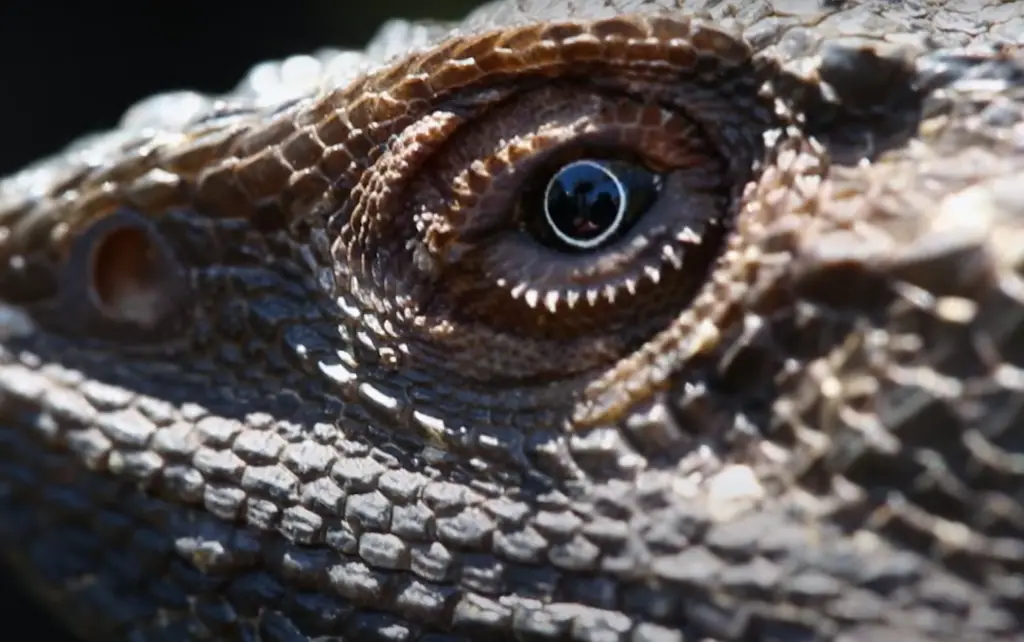
One reason for a bearded dragon to bite is if it feels threatened or scared. If they feel as though they are in danger or cornered, they may bite as a defensive reaction. In this case, it’s crucial to respect their boundaries and give them space to feel secure.
Another reason for biting is when a bearded dragon is feeling territorial. Bearded dragons are solitary creatures and can become aggressive towards other bearded dragons if they feel threatened by their presence. In this case, it’s best to keep bearded dragons separated to prevent any fighting or injuries.
Sometimes, beardies may bite out of hunger or mistaking fingers for food. Therefore, it’s essential to wash your hands before you contact them, so they do not mistake your fingers for food. It’s also important to make sure that they are getting enough food throughout the day to prevent any issues with biting.
If your beardie bites you, it’s essential to remain calm and not pull your hand away suddenly. When you pull your hand away, it can cause damage to their teeth and mouth. Instead, gently push the bearded dragon’s jaw open to release your finger.
So, these reptiles are not likely to bite unless they feel threatened, territorial, hungry or mistake fingers for food. If you plan on owning a bearded dragon, it’s crucial to understand their behavior and be respectful of their boundaries. However, if you do get bitten, remain calm, and gently push their jaw open to release your finger. With these tips, you can safely enjoy owning a bearded dragon without worrying about bites.
Bearded Dragons: Are They Poisonous?
Beardies are gentle, friendly and make a great pet for people of all ages. With their unique appearance and fascinating behavior, they have been an inspiration for myths and legends for years. One of these myths is that bearded dragons are poisonous, which has led to many people questioning whether they are safe to keep as pets. Here we will delve into whether bearded dragons are indeed poisonous and what precautions you should take when handling them. So, if you own a bearded dragon or are planning to keep one soon, read on to gain some valuable insights.
The answer to the question of whether bearded dragons are poisonous is a resounding NO.
This myth has been around for a long time, and it did not originally come from any scientific evidence. Instead, the myth probably started because bearded dragons are sometimes referred to as “poison lizards” due to their defensive behavior.While bearded dragons are not poisonous, they do contain bacteria in their feces that can cause a severe gastrointestinal infection called salmonella. Therefore, owners should always ensure they maintain good hygiene when handling their pets. Always wash your hands thoroughly with warm soapy water after touching your bearded dragon, and do not allow them to come into contact with food preparation areas, including kitchen counters.
Another thing to note when it comes to bearded dragons and safety is that they have sharp claws and teeth. While they are usually gentle creatures that do not bite, they might scratch or bite if they feel scared or threatened. If you must pick up your reptile pet, ensure you do so carefully, supporting their weight with both hands, or allow them to climb onto your hand or arm.
While bearded dragons are not poisonous, they can still pose a danger to other animals in the house, especially small pets such as hamsters, mice or birds. If you have more than one pet at home, never allow them to interact with each other without supervision. It is essential to keep your bearded dragon in an enclosed area or terrarium to prevent them from wandering around the house and coming into contact with other animals.
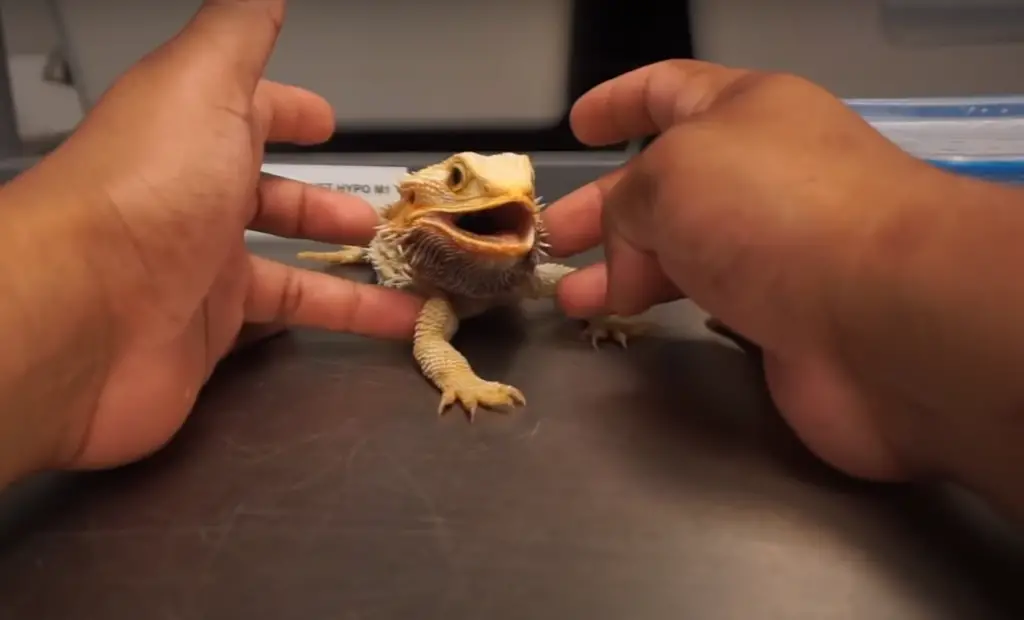
In conclusion, bearded dragons are not poisonous; this is merely a myth. However, they do carry bacteria that can cause a severe gastrointestinal infection called salmonella, so it is essential to take necessary precautions when handling them, such as washing your hands thoroughly after handling them. They also have sharp claws and teeth, so you must be careful when handling them to avoid scratches or bites. If you have more than one pet, it is important to keep them separated when they are not being supervised, to avoid any incidents. Bearded dragons make great pets, and there is nothing to worry about when it comes to their safety. Just remember to provide them with a proper home, food, and attention. They are gentle creatures that will bring much joy and companionship to their owners. We hope you have found this blog post informative and helpful. Feel free to share it with your friends and family who might have questions about the safety of bearded dragons.
The Reasons Why Bearded Dragons Bite Humans
Bearded dragons are one of the most beloved pets in the world. They’re friendly, gentle, and extremely adorable. However, there are moments when they can be a bit moody and may bite their owners, which can be alarming and sometimes painful. The common question is, why do bearded dragons bite humans? In this part, we will discuss the reasons behind this behavior and what you can do to prevent it from happening.
Fear or Stress
When bearded dragons are subjected to an unfamiliar environment or are put in uncertain situations, they could feel threatened or scared. As a result, they may bite out of self-defense. If you’re handling your bearded dragon and they suddenly bite, it’s best to put them back into their enclosure and give them time to calm down. [3]
Hungry or Agitated
Another reason why your reptile pet may bite is when it is feeling hungry or agitated. These animals are known to be active during the day and tend to fall into a deep sleep at night. If you’re handling your dragon at night or when they’re in the middle of their sleep cycle, they may bite you out of annoyance.
Maternal Instincts
Sometimes, female bearded dragons may exhibit aggressive behavior or even bite their owners when they’re nest-building or laying eggs. This behavior is driven by their maternal instincts to protect themselves and their offspring. If you have a breeding pair of bearded dragons, it’s best to handle them with care during this time.
The “Terrible Twos”
Bearded dragons also go through a developmental stage known as the “Terrible Twos.” During this phase, they tend to display erratic behavior and may become territorial and aggressive. It’s important to be mindful of this behavior and give them plenty of space to roam around or climb.
Lack of Socialization
Lastly, the lack of socialization may lead to a beardie biting their owner. If you don’t handle your dragon often or don’t provide them with enough socialization with other animals and humans, they may become timid and lash out when you try to handle them. [3]
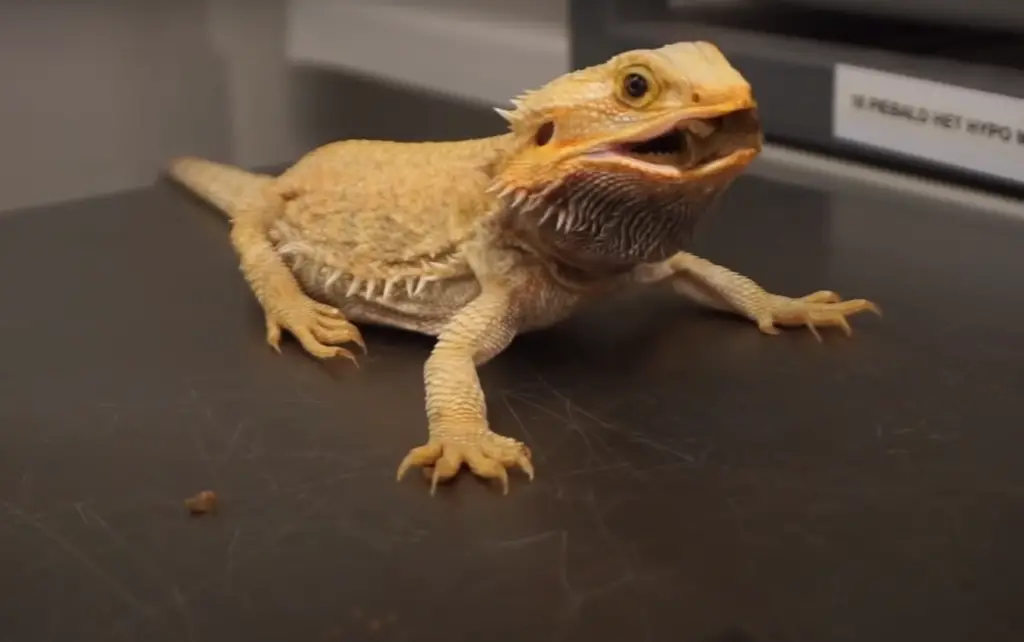
Understanding why bearded dragons bite their owners is crucial for the safety and well-being of these animals. Just like humans, they experience mood swings and may react in unexpected ways. By providing them with a comfortable environment, socialization with other animals, and handling them with care, you can prevent them from exhibiting aggressive behavior. Remember, be patient and gentle when handling your dragon, and don’t take their bites personally. With a little bit of effort and understanding, you can have a happy and healthy relationship with your bearded dragon.
Bearded Dragons Bites: How to Stop
Bearded dragons are fascinating pets that are loved for their laid-back nature and unique appearance, which includes having a beard that can puff up. However, even the gentlest bearded dragon can bite at times, leaving its owner wondering what went wrong. While a bite from a bearded dragon does not usually require medical attention, it can be painful and startling. Here we are sharing a few tips on how to prevent bearded dragon bites and what to do if your pet bites you.
It is essential to understand why bearded dragons bite so that you can avoid getting bitten in the first place. Bearded dragons are not naturally aggressive animals, so they usually bite in response to fear, stress, hunger, pain, or territorial instincts. The most common reasons include being mishandled, frightening experiences such as loud noises or sudden movements, feeling hungry, or being in pain. As the owner, it is essential to recognize your bearded dragon’s body language and avoid putting them in situations that make them feel uncomfortable.
Start with proper socialization
Bearded dragons that are not used to human interaction are more likely to bite, so it is crucial to start socializing your dragon as early as possible. Spend some time with your pet each day, holding them gently and talking to them in a soothing voice. Slowly introduce them to other people and pets over time. While socializing your bearded dragon, pay attention to their body language, which will give you an indication of how they are feeling. If they show signs of distress, such as puffing up their beard or hissing, stop the interaction immediately.
Handle your bearded dragon correctly
Improper handling is one of the main reasons why bearded dragons bite. Always approach your bearded dragon with caution and try to pick them up from underneath, supporting their entire body. Avoid grabbing them by the tail, limbs or head. When handling, support their entire body and avoid jerky movements or sudden noises. Doing so can make your pet feel secure and reduce the chances of being bitten.
Avoid stressors
Stress is a critical factor for bearded dragons, as it can trigger aggressive behavior. Avoid any stressors in your bearded dragon’s environment, such as making sudden changes in the habitat, moving their cage frequently, or causing loud noises or other unpleasant experiences.
Train your bearded dragon
Training your bearded dragon can help reduce the chances of getting bitten, as it can teach them to be more tolerant of human interaction. To train your bearded dragon, start with basic commands such as “sit” or “come” and reward them with their favorite food or treats. Gradually increase the complexity of the commands over time. Training your bearded dragon not only reduces the chances of bites but also helps them become more engaged and stimulated.
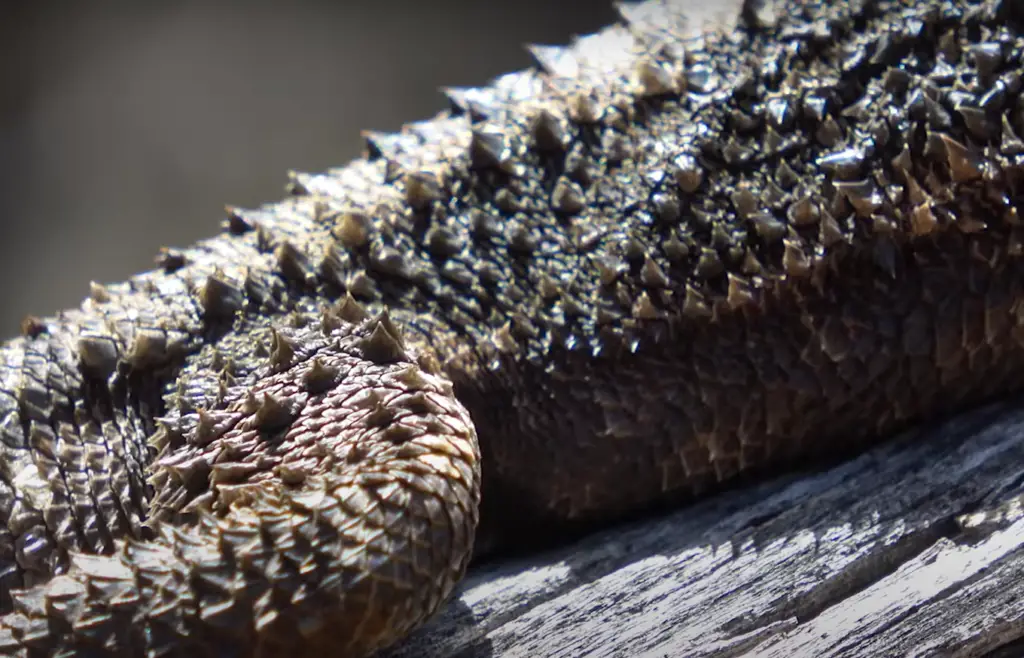
Bearded dragon bites can be painful, but with proper handling, socialization, and training, you can prevent them from occurring. It is essential to understand your bearded dragon’s behavior and body language to react appropriately during interactions. If your bearded dragon does bite you, remain calm and try to remove the dragon from your hand by gently tapping its nose with your finger. Do not pull away from the bite, as it may injure the dragon’s teeth. Seek medical attention if you are concerned about the bite or if you notice any signs of infection. Bearded dragons can be loving, affectionate pets when treated properly, and preventing bites is essential to building a happy and healthy relationship with your pet.
Damage of a Beardie’s Bites
Bearded dragons, commonly known as “beardies,” are fascinating pets that have become increasingly popular over the years due to their easy maintenance and laid-back personalities. They are docile pets that enjoy basking in the sun and interacting with their owners, making them great pets for both children and adults alike. However, one thing that is important for all owners to know is the potential dangers of a beardie’s bites. Although they are not inherently mean or aggressive, these bites can be quite harmful and even lead to serious complications if left untreated. Let’s explore the damages of a beardie’s bites and the measures one can take to prevent them.
Firstly, it’s crucial to realize that a beardie’s bite is not the same as a dog or cat bite, but it can be just as dangerous. These bites are usually not intended as aggressive attacks, but rather defensive or territorial reactions. When threatened or uncomfortable, bearded dragons can clamp down on a finger or hand with considerable force, potentially breaking the skin and causing injury.
Not only can these bites be painful, but they can also lead to infection if not treated immediately. Moreover, bites from beardies can also introduce harmful bacteria into the bloodstream, which can travel to other parts of the body and cause sepsis. This is a potentially life-threatening condition that can result in tissue damage, organ failure, and even death if left untreated.
Additionally, some beardies may carry salmonella in their mouths, which can be transmitted to humans through a bite. This bacterial infection can cause symptoms like diarrhea, fever, and abdominal cramps.
But what is necessary to do if your bearded dragon bites you?
Firstly, remain calm and still to avoid further agitating the lizard. Gently loosen its grip by tapping on its jaw or running it underwater to encourage it to let go. Then, clean the wound thoroughly with soap and warm water and cover it with a sterile bandage. If you experience any symptoms of salmonella or sepsis, seek medical attention immediately. Preventing bites from beardies is much easier than treating them.
Firstly, always approach your pet slowly and gently to avoid startling it. Never attempt to touch or pick up a beardie from above, as it may perceive it as a threat. Ensure that your beardie has enough space to move around and bask comfortably, as cramped conditions can lead to stress and aggression. And finally, always wash your hands before and after handling your lizard to reduce the risk of infection.
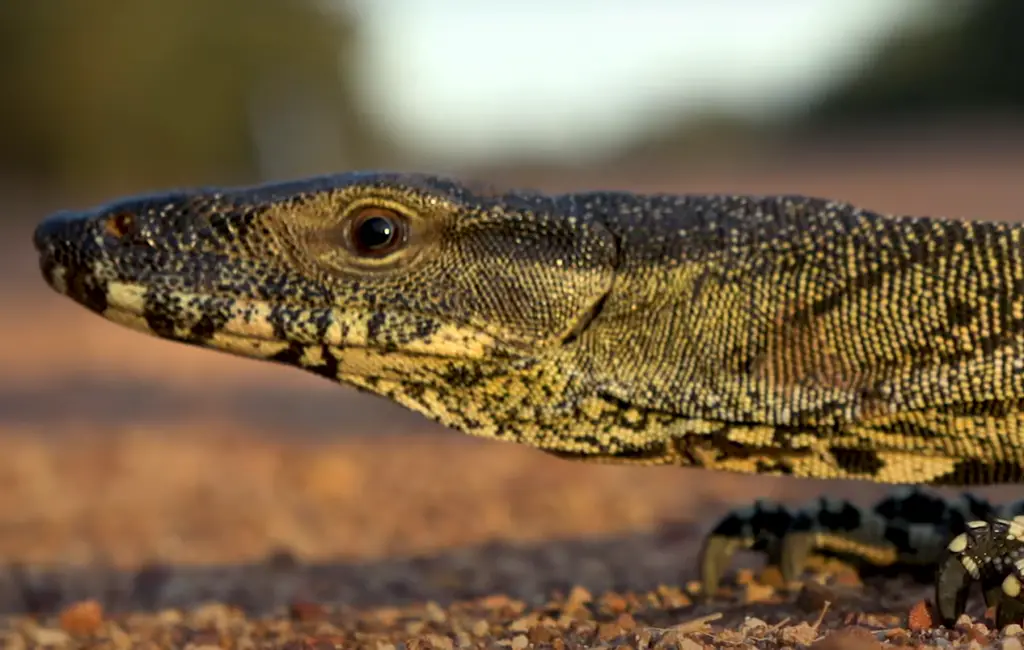
In conclusion, beardies are wonderful pets that bring joy and relaxation to many owners.
Remember to always approach your lizard slowly and gently, give it enough space to be comfortable, and wash your hands before and after handling it. And if you do get bitten, seek medical attention immediately and closely monitor the wound for any signs of infection or complications. With these tips in mind, you and your beardie can enjoy a long and happy life together.FAQ
Do bearded dragons like to be held?
Yes, bearded dragons enjoy human interaction and will bond with their owners over time. However, it is important to note that not all bearded dragons like to be held, and some may be more comfortable with simply being beside you.
How sore is a bearded dragon’s bite?
Bearded dragons are generally friendly and do not bite unless they feel threatened or scared. Their bites, although painful, are relatively harmless.
Are bearded dragons’ teeth sharp?
Bearded dragons are omnivores and require a diverse diet that includes insects, fruits, and vegetables. Their teeth are small and sharp, perfect for biting and tearing food into smaller pieces. Although their teeth are not venomous and not used as a weapon, they can scratch or puncture the skin if handled roughly or if they feel scared or threatened.
Useful Video: Do bearded dragons bite let’s see…
Conclusions
In conclusion, bearded dragons are generally not aggressive, and most bites occur as a result of fear or stress. With proper care and handling, bearded dragons can become friendly and docile pets. Be mindful of their behavior and take steps to establish trust with your pet to prevent bites from happening. If a bite does occur, stay calm and take action to prevent infection. With patience and care, your bearded dragon can thrive as a happy and healthy companion.
References:
- https://animals.mom.com/pros-cons-owning-bearded-dragon-9743.html
- https://www.hepper.com/do-bearded-dragons-bite/#:~:text=Bearded%20dragons%20are%20willing%20to,beardies%20have%20bad%20days%20sometimes
- https://reptile.guide/bearded-dragon-bite/

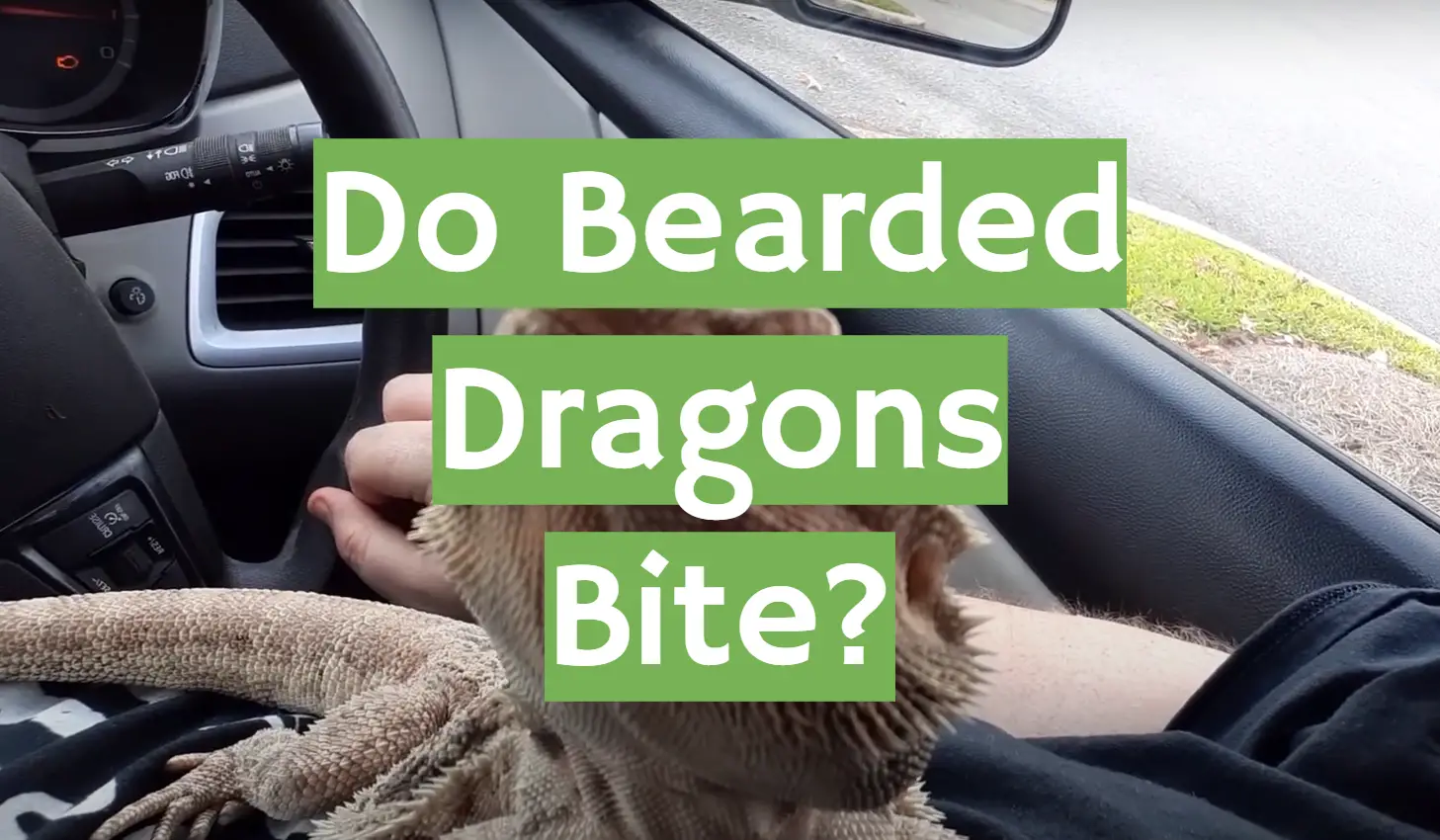
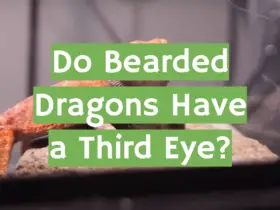



Leave a Review